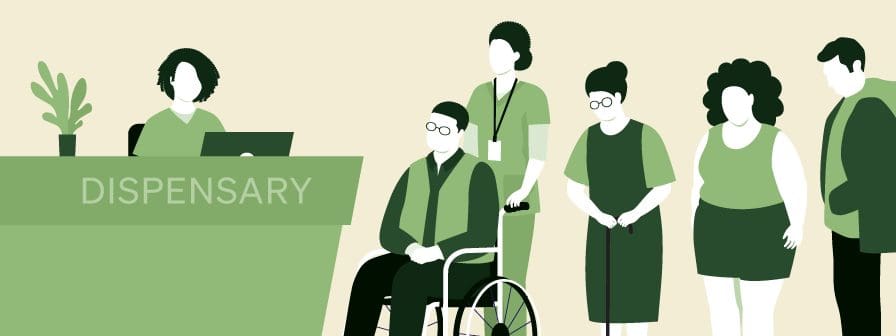Recreational cannabis legalization comes with implications for longtime medical cannabis patients, according to new study
4 min read



Featured experts

Mitchell Doucette, PhDSenior Director of Research
As a growing number of states legalize cannabis for recreational use (i.e., adult use), it is becoming more accessible than ever before. While this is a win for the cannabis industry, we’re starting to see how these changes are affecting the experiences of medical card holders in states that allow both medical and recreational use.
In a recent study co-authored by Leafwell and researchers at the University of Michigan, University of Buffalo, Washington State University, and Legacy Health, and published in the Journal of Psychoactive Drugs, medical patients residing in states that permit adult-use cannabis were asked about how their experiences as cardholders have changed following recreational legalization. Based on the findings, it’s clear that the unique needs of medical patients must be carefully considered.
Key Findings
- In states that have legalized adult-use cannabis after being medical-only, the availability of medical cannabis products has increased but the cost of products has also increased.
- Medical patients largely report a positive shift in social attitudes toward cannabis use following recreational legalization.
- 59% of medical patients feel that dispensaries carry products more suited to their medical needs following adult-use legalization, compared to 41% before adult-use legalization.
- Still, many medical patients reported that dispensaries emphasize the needs of recreational users over medical users. For example, dispensaries may prioritize higher-THC products that appeal to recreational users, but alienate medical users seeking out cannabis’ therapeutic effects over its psychoactive effects.
- 62% of those surveyed also feel that their state legislators prioritize the needs of recreational users over the needs of medical patients.
- Medical patients’ needs must be addressed, especially concerning product affordability, and accessibility to products geared toward medical users.
The changing landscape of the cannabis industry, and what it means for medical patients

To date, 24 states have legalized adult-use cannabis, all of which previously permitted medical-only. By and large, these states have reported significant drops in registered medical cannabis users.
In theory, recreational legalization should improve a medical patient’s experience, enhancing accessibility to more dispensaries and products. But the study, conducted by Leafwell in collaboration with the University of Michigan, the University of Buffalo, Washington State University, and Legacy Health, shows more nuanced findings.
445 medical cannabis patients from 22 adult-use states and Washington D.C. were selected to participate in the study. They were asked about their recent purchasing experiences from dispensaries that supply to both medical and recreational users. Patients were asked about product cost, quality, and availability. They were also asked about their health, and whether or not they felt their health-related needs were addressed while shopping for cannabis.
One of the findings was an increase in product cost following legalization. This observation included all cannabis product types. The study notes that this may be due to patients who had medical cards but stopped renewing them after recreational cannabis was legalized. Those patients may be paying higher amounts in taxes than they did previously.

One patient noted, “[recreational sale]…Has definitely put a big dent in medical user pockets. It used to be very affordable before rec.”
Patients also noted some positives. For example, the majority of patients agreed that recreational legalization promotes more positive attitudes toward cannabis use overall, further lessening the stigma among cannabis users.
Another positive observed among the majority of patients was lower stress levels about their cannabis usage. With adult use being legalized, medical patients have become less concerned about legal ramifications for possession. While medical cannabis laws allow patients to possess, patients enjoy a reduced risk of being stopped by law enforcement for possession.

One question was about accessibility to products that meet patients’ unique medical needs. 59% of patients reported that they feel they can access a wider variety of products than before adult-use cannabis was legalized. They also noted that overall, product quality seems to be better, particularly with dry cannabis flower.
However, a surprising number of patients feel that since recreational use became legal in their state, the needs of medical patients have been deprioritized in favor of recreational users.

One patient noted, “Legalization/adult use tends to focus on the recreational side too much, and those of us who need it for ailments have to compete with each other or hear things like they’ve stopped selling certain products in the dispensary. For instance if I don’t like the feeling of being high and I get a vape that’s more CBD… now it’s hard to find because the high highs sell more. Or if I want a lotion that works well they’re changing brands or the formula and it’s just no longer available. It’s annoying.”
Further, 62% of survey participants feel that state legislators are more interested in serving the needs of recreational users than those of medical users.
Why is Leafwell’s contribution to this research study so important?
- Better Access to Medically Beneficial Products: If we know how well products at dispensaries match the concerns of medical patients, it can lead to more medically beneficial products being developed and brought to the market to meet customer needs.
- Saves Money: Our research may help businesses and state governments make cannabis more affordable to patients.
- Supports Better Legislation: By surveying patients nationwide, we can work toward better legislation that benefits all medical cannabis patients.
Conclusion
The majority of patients surveyed reported positive changes overall. However, the increase in cost has clearly affected many medical patients since recreational cannabis has become legal in their state. It’s also worth noting that many patients feel that the products at dispensaries appeal less to their needs, and more to those of recreational users.
States that have implemented adult-use cannabis laws may consider better addressing medical patients’ desires for access to affordable cannabis, and products that address their unique health-related concerns.


